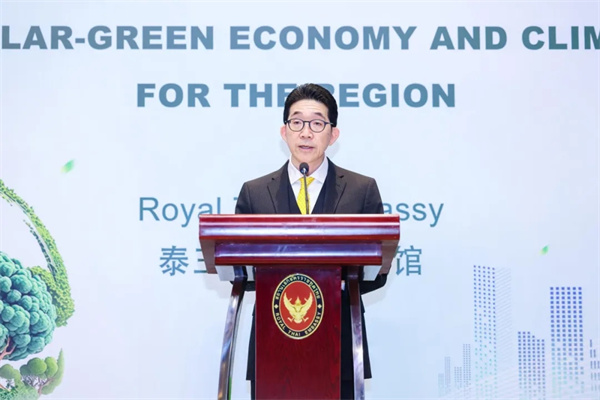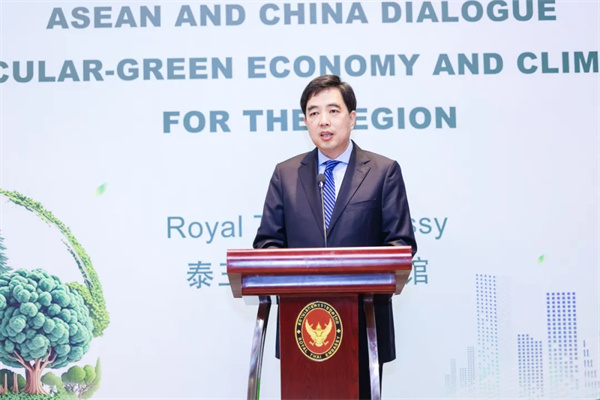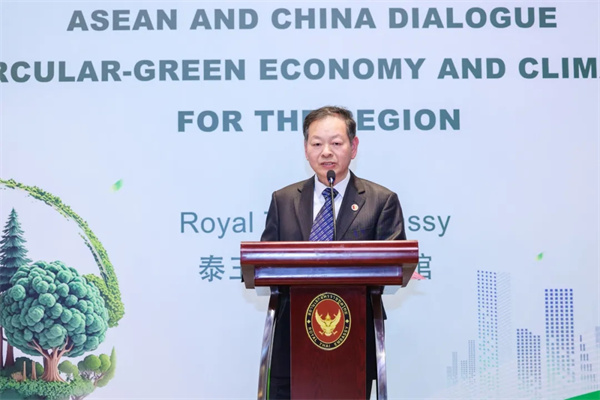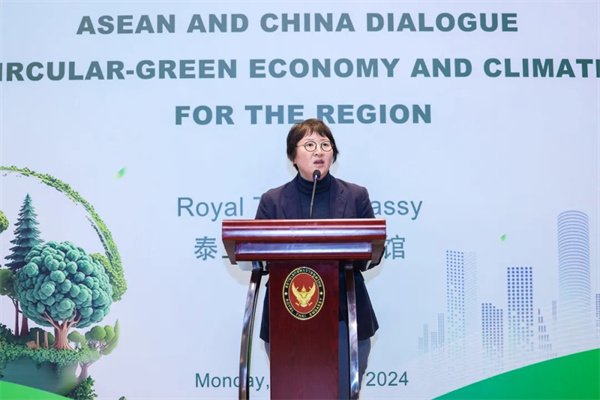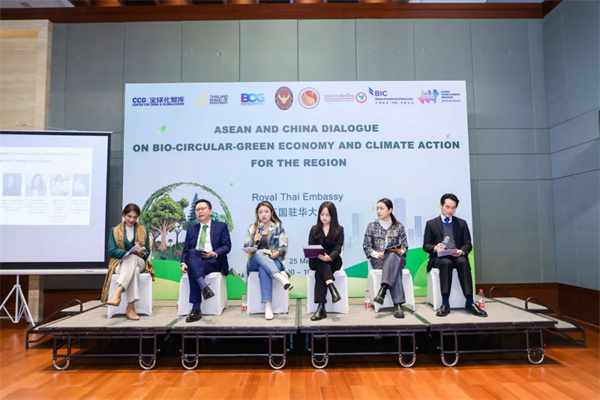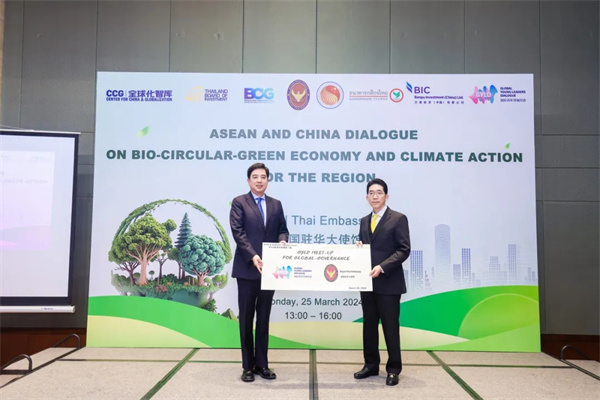The China-ASEAN Green Dialogue Held in Beijing
March 25 , 2024
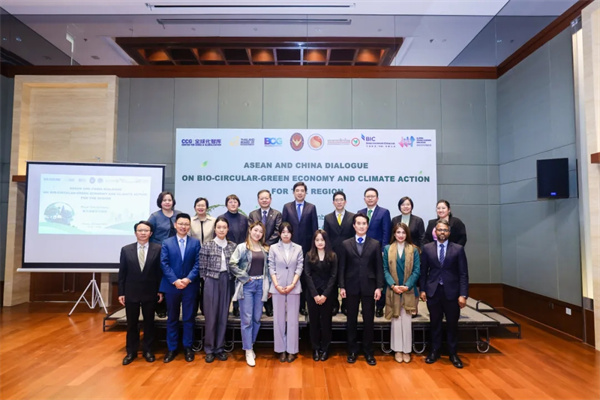
On the afternoon of March 25, 2024, the ASEAN-China Dialogue on Bio-Circular-Green Economy and Climate Action for the region, co-hosted by the Center for China and Globalization (CCG), the Royal Thai Embassy in China, the ASEAN-China Centre, and the Global Young Leaders Dialogue (GYLD) program, was successfully held at the Royal Thai Embassy in Beijing. Experts and scholars from government, business, academic think tanks, and international organizations, along with young professionals from a number of countries discussed topics related to the theme and engaged in interactive exchanges of views.
As the issue of global climate change becomes increasingly acute, the push for strengthening green economy and sustainable development have become a common focus of attention for all countries. China and ASEAN, as neighbors and important partners, have many potential areas for cooperation in the field of green economy and climate action. This year marks the China-ASEAN Year of People-to-People Exchange, and this dialogue aims to strengthen exchange and cooperation between the two sides in this field, jointly address the challenges of climate change, and promote the sustainable development of the regional economy and society.
Benjamin Sukhanjanajit, the Chargé d’Affaires ad interim of the Royal Thai Embassy in China, stated in his speech that Thailand has always been committed to achieving the United Nations Sustainable Development Goals (SDGs) and is striving to achieve carbon neutrality. The BCG (Bio-Circular-Green) economic model is seen as a pathway to building a healthier, greener, and more inclusive economy. By readjusting Thailand’s national energy plan and shifting its focus to improving energy efficiency, a gradual green transformation is being pushed forward. He stated that he hoped the day’s discussion would promote more meaningful cooperation between China and ASEAN.
Mike Liu, the Vice President of the Center for China and Globalization (CCG) also delivered a speech in which he shared China’s strategic planning and achievements in the area of green development. He also introduced work carried out by CCG over the past few years, including hosting ambassador roundtables focusing on climate change and supporting the GYLD in conducting climate change-themed activities. He reiterated his confidence that cooperation between China and ASEAN in the field of green development would continue to deepen.
Guo Chuanwei, the Director of Trade and Investment Division of ASEAN-China Centre, highlighted that China and ASEAN have made significant progress in their cooperation on green development, engaging in deep collaboration in environmental technology and clean energy sectors. He stressed that green development is not just a necessary response to global climate change, but also a crucial means to drive sustainable economic growth in the region.
Li Xia, the Director of the International Environmental Cooperation Center of the Ministry of Ecology and Environment and the China-ASEAN Environmental Cooperation Center, focused on cooperation between ASEAN and China in green and low-carbon development. She emphasized the need for China and ASEAN to continue systematic exchange discussions, enhance information exchange, share experiences, and match demands in the field of green development. She also called for both sides to solidly promote pragmatic cooperation on green projects, while also deepening communication and cooperation across the entire industry chain of the green and low-carbon economy, including green technology, green equipment, and green services.
Following the keynote speeches, the event featured a panel discussion with a theme focusing on “The Key Aspects to Enhancing Green and Sustainable Development Cooperation between China and ASEAN”. Supee Teravaninthorn, Special Advisor to the Vice President of the Asian Infrastructure Investment Bank; Wantana Tadtan, Senior Professional Investment Promotion Officer at Investment Promotion Bureau 3; Elisani T.X. Nadia Sumampo, Economic Counselor at the Embassy of Indonesia in China; and Michelle Tiong, Postdoctoral Reserach Fellow at the China University of Petroleum (Beijing), shared their views on knowledge, policy and talent in terms of the opportunities and challenges in green economic cooperation between China and ASEAN. They also offered valuable suggestions on how to deepen cooperation. The discussion was chaired by John Zhao, Director of External Relations at CCG and Manager of the GYLD program.
Moreover, the event also included a China-ASEAN Regional Climate Action discussion session with GYLD members focusing on the “Challenges Facing Energy Security and the Achievements of Green Technology and Finance in the region.” Young representatives from China, Malaysia, Thailand, and other countries delved into issues of energy security, green technology, and finance. Panelists included Wichai Narongwanich, First Senior Vice President of Kasikornbank PCL; Zhang Xiangdi, member of the Global Shapers Community Beijing Hub 2; Jia Le Lim, President of the Tsinghua University China-ASEAN Student Association (ASEAN representative); Yang Zhou, Project Lead China Regional Transition at Agora Energiewende; and Puen Pramudwinai, Director of Strategic Planning and Analysis at Banpu China. Each of these young professionals made excellent contributions to the discussion in topics ranging from finance, consumerism, technology, policy, youth participation, and community. The discussion was chaired by Zoon Ahmed, CCG Research Fellow and member of GYLD.
This event is also the second installment of the GYLD@Embassy series, dedicated to providing international young professionals with opportunities to engage in dialogue and exchange with diplomats, officials from international organizations, and other professionals. It aims to deepen understanding of frontline practices in global governance, fostering friendships among international youth, and enhancing the vibrancy of the GYLD community.
Keyword
